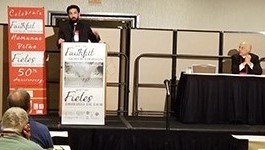The Spring and Summer of 2018 were some of the greatest months of my life. In the middle of May I graduated from St. Patrick’s Seminary in Menlo Park, California, after seven years of studies. At the end of that same month I was ordained a priest and celebrated Mass for the first time in front of my home parish, which was packed. In June, I took a ten day vacation with 24 members of my family. In July, I moved into my first parish assignment as parochial vicar. And later that month, the CANFP Board saw years of work come to fruition in Ontario, California at the conference they hosted celebrating the 50th anniversary of Pope Paul VI’s encyclical Humanae Vitae. It was truly a blessed time to be a priest.
And then August rolled around. It had been 16 years since the devastating sexual abuse scandal broke in Boston, and now the wound had been re-opened with news coming from Pennsylvania of widespread clergy abuse. Suddenly, the “honeymoon” (as people like to call the immediate period after ordination), seemed to be coming to an end.
For about the first month after the Pennsylvania news broke, each homily of the three priests and one deacon at our parish revolved around this scandal. Likewise, each parish in our diocese was asked by our bishop to host a holy hour to pray for victims of abuse. In addition to this prayer service, a group in our parish held their own service, where they invited a victim of clergy sexual abuse to speak; it was an intense, and moving, evening. It was during these first few weeks after the news came that some people decided to no longer contribute to the weekly collection, and others decided to remove themselves from the Church completely.
This may cause many people to think that this is the worst possible time to be a priest. Indeed, it has been difficult, especially when some of the accused are known to us, and yet, if there is one thing about the church that is true it is that in the most difficult times, She shows Her true colors. For my part, I have not experienced any ill will from parishioners, or random people who see me wearing the clerics around town. On the contrary, the parishioners at the parish where I am assigned have been nothing but gracious and kind, which I do not attribute to apathy or indifference, as if they were throwing their arms up in the air saying: “another abuse scandal; oh well, nothing new.” Rather, I attribute their attitude to authentic faith in the power of the Holy Spirit who leads and guides the Church during this dark time, as well as to a genuine love for their priests and the mission they have to lead people to, and teach them about, Jesus Christ.
That being said, it has been somewhat difficult discerning where the “honeymoon” ends and where ordinary priesthood begins. What I mean by this is that the initial thrill of celebrating Mass with the community has not waned. Call me naïve or idealistic, but hearing people confess their sins with courage, and going on hospital visits to anoint the sick always leaves me feeling humbled and unworthy of this calling. Despite this most recent scandal, the people of God have not wavered or given into despair; their faith is strong, and they have doubled down on their own calling to support their priests, especially a new one, and to encourage him to be the best priest for them that he can be. In doing so, they have proven to me in a new way that the Church is truly holy, and in doing so, have clarified for me that mission of leading and teaching. They have shown me that they have not given up on the Church, but that they are hungry; hungry for Jesus and for His truth, and they expect their priests to feed them.

Fr. Mario Rizzo, ordained a priest for the Diocese of Oakland in 2018, is parochial vicar at Christ the King in Pleasant Hill, and has served on the Executive Board of CANFP since 2016, having been first introduced to the work of CANFP as a seminarian attending a program CANFP provided for the seminarians of the Diocese of Oakland.
